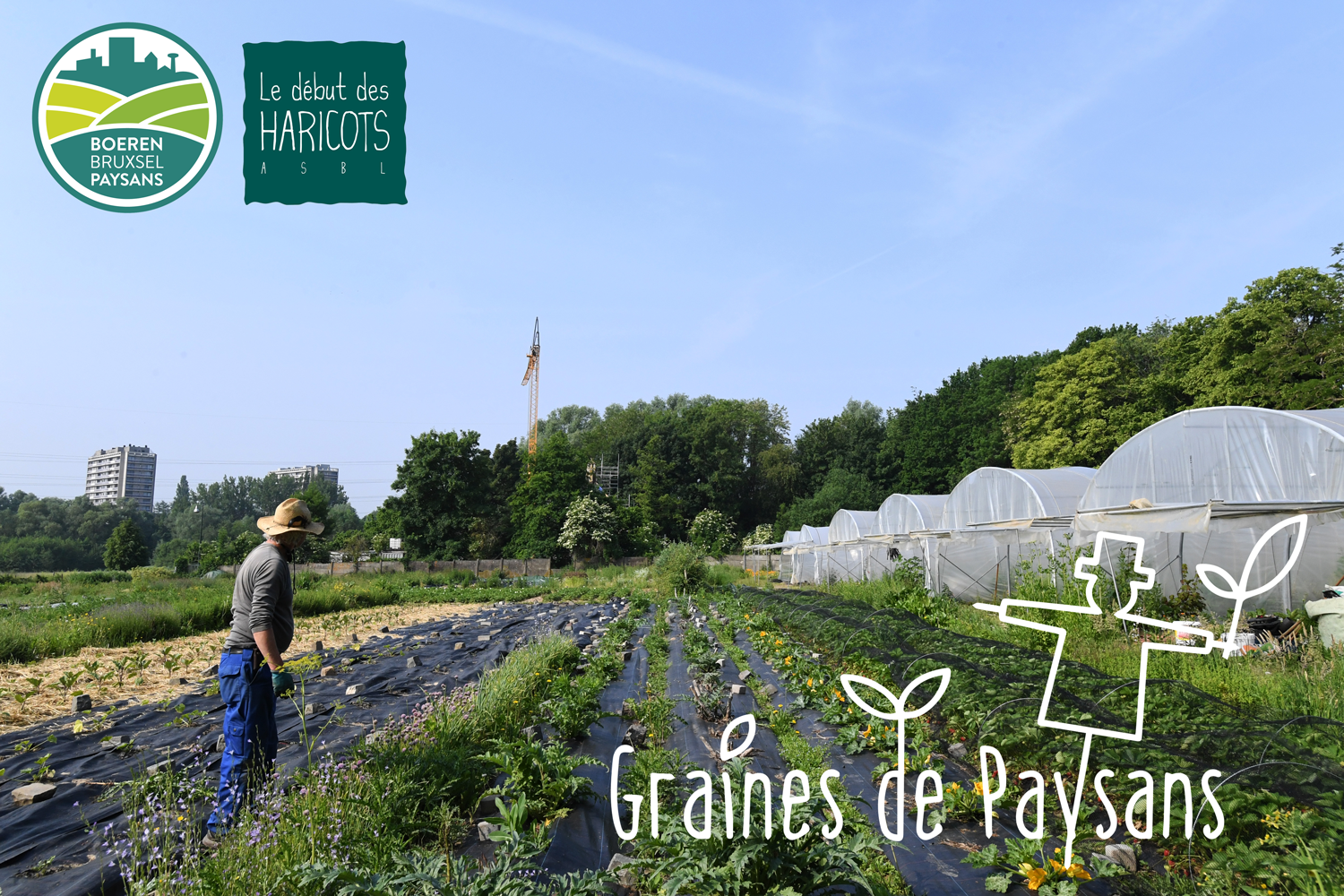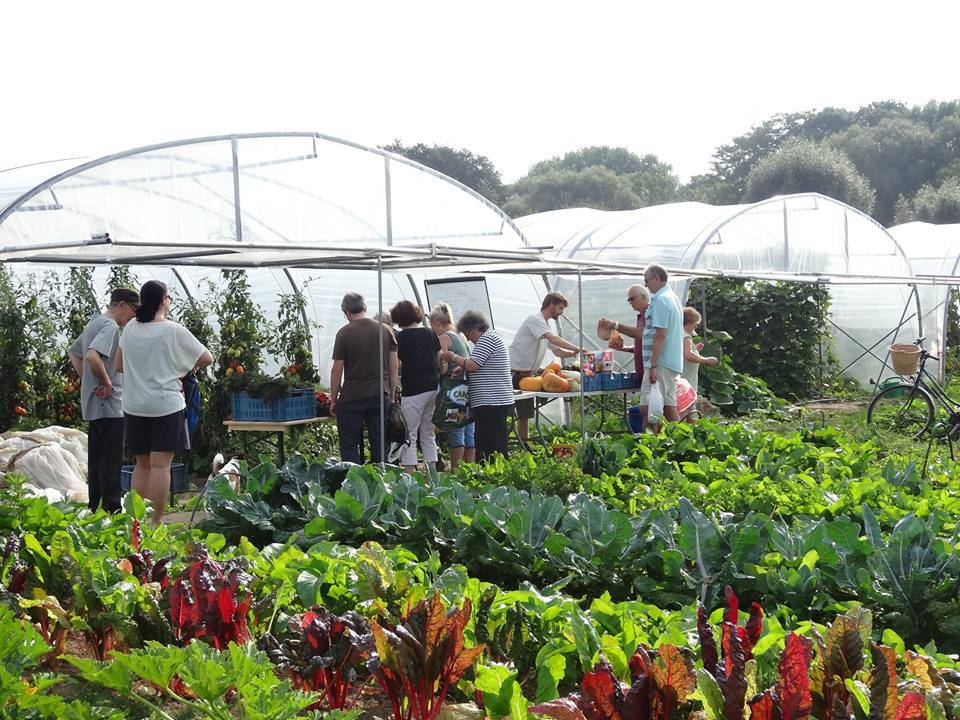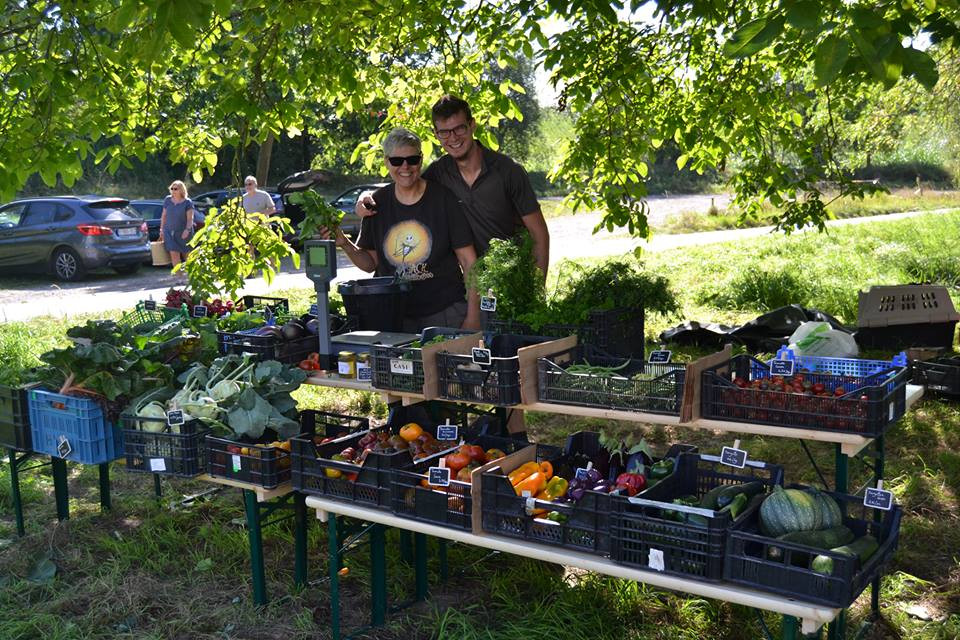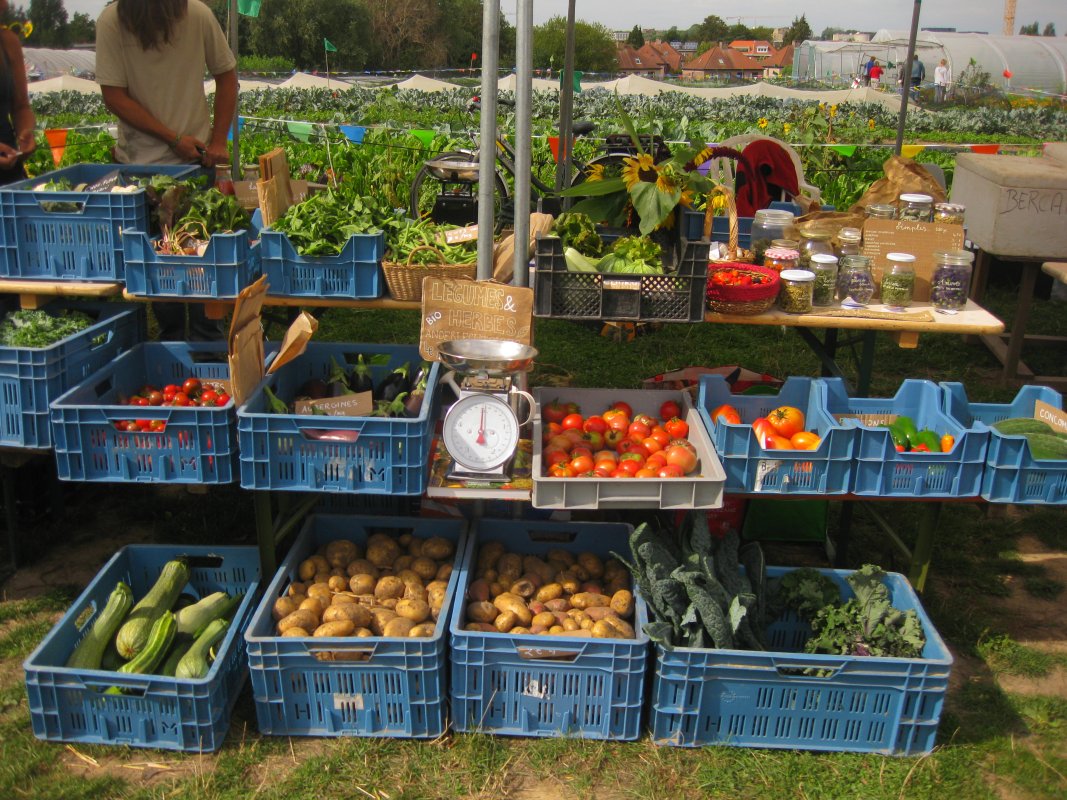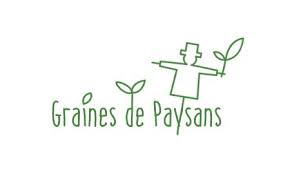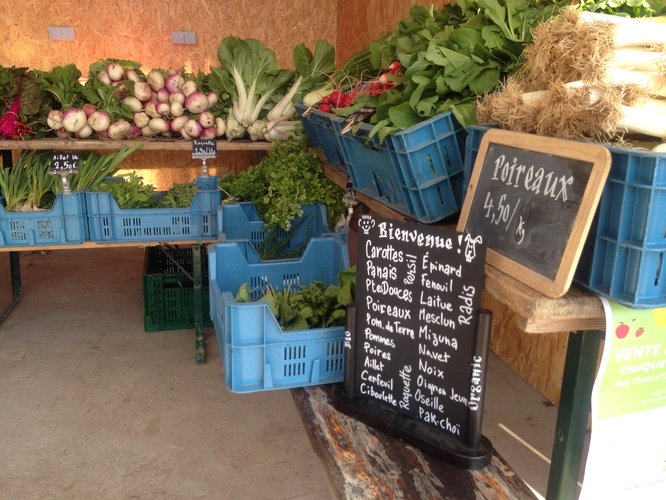Espace test agricole "Graines de Paysans
Basic information
Project Title
Espace test agricole "Graines de Paysans
Category
Prioritising the places and people that need it the most
Project Description
The "Graines de Paysans" project is the first agricultural business incubator in the Brussels region, aimed at supporting young Brussels-based farmers in gradually creating viable and environmentally balanced agricultural activities. The project provides them with the means of production and a comprehensive support program to test their agricultural models in a secure environment for a defined period before transitioning to independent and sustainable operations.
Geographical Scope
Regional
Project Region
région Bruxelles-Capitale, Belgium
Urban or rural issues
Mainly urban
Physical or other transformations
It refers to other types of transformations (soft investment)
EU Programme or fund
Yes
Which funds
ERDF : European Regional Development Fund
Description of the project
Summary
The 'Graines de Paysans' project, situated in the Brussels region, serves as the first agricultural activities incubator in the area. Its primary goal is to support young Brussels-based farmers in progressively developing viable agricultural models in harmony with the social and natural environment. The initiative offers a secure testing space, equipped with production means, and provides comprehensive guidance covering technical, viability, marketing, and collective dynamics aspects. The test activity phase grants aspiring agricultural entrepreneurs temporary access to land and production tools, facilitating a smooth transition to independent projects.
The project's specific objectives include job creation in agriculture, contributing to agroecological transition, launching viable small-scale agricultural enterprises, producing fresh and seasonal goods in an urban context, and establishing connections between producers and consumers in Brussels and its surroundings. The supportive follow-up within the agricultural test space follows a continuous education logic, equipping farmers with technical, administrative, and commercial skills.
Over the years, the project has evolved, introducing innovative elements such as the "Ultra Tree" and "Co-create Innorivis" research-action project. Furthermore, it seeks to expand its impact by transitioning from a temporary test space to a permanent one, aiming to address challenges like land access and economic viability for sustainable agricultural initiatives in the long term. The project's success is evident in its track record, with numerous new agricultural activities emerging from the incubator since its inception in 2016, demonstrating tangible outcomes in supporting the growth of sustainable agriculture in the Brussels region.
The project's specific objectives include job creation in agriculture, contributing to agroecological transition, launching viable small-scale agricultural enterprises, producing fresh and seasonal goods in an urban context, and establishing connections between producers and consumers in Brussels and its surroundings. The supportive follow-up within the agricultural test space follows a continuous education logic, equipping farmers with technical, administrative, and commercial skills.
Over the years, the project has evolved, introducing innovative elements such as the "Ultra Tree" and "Co-create Innorivis" research-action project. Furthermore, it seeks to expand its impact by transitioning from a temporary test space to a permanent one, aiming to address challenges like land access and economic viability for sustainable agricultural initiatives in the long term. The project's success is evident in its track record, with numerous new agricultural activities emerging from the incubator since its inception in 2016, demonstrating tangible outcomes in supporting the growth of sustainable agriculture in the Brussels region.
Key objectives for sustainability
The key objectives of the 'Graines de Paysans' project align with sustainability on multiple fronts, encompassing economic, environmental, and social dimensions. The project's exemplary nature lies in its holistic approach to fostering sustainable agriculture and its success in meeting these objectives.
Graines de Paysans' exemplifies sustainability by integrating economic viability, environmental stewardship, and social inclusivity. Its innovative approach and commitment to addressing challenges make it a model for sustainable agricultural initiatives globally. The project's impact extends beyond individual farms, contributing to the broader goal of building a resilient and sustainable food system in the Brussels region.
1. Economic Sustainability : the project addresses economic challenges during the startup phase by providing a secure testing ground, mitigating risks, and ensuring access to capital. The 'island' test model innovatively combines permanence and testing, promoting long-term economic viability.
2. Environmental Sustainability: The project actively supports agroecological practices on small, non-mechanized plots, fostering a diverse, sustainable, and nature-friendly approach to agriculture. The emphasis on proximity to consumers aligns with sustainable urban agriculture practices, reducing the carbon footprint associated with food production and distribution.
3. Social Sustainability: Graines de Paysans' prioritizes gender balance, evident in its 38% - 62% male-female ratio. The project's open-minded approach welcomes individuals from diverse cultural backgrounds, contributing to the social fabric of the community. Additionally, by providing access to production means for those with limited economic means, the project enhances social equity.
Graines de Paysans' exemplifies sustainability by integrating economic viability, environmental stewardship, and social inclusivity. Its innovative approach and commitment to addressing challenges make it a model for sustainable agricultural initiatives globally. The project's impact extends beyond individual farms, contributing to the broader goal of building a resilient and sustainable food system in the Brussels region.
1. Economic Sustainability : the project addresses economic challenges during the startup phase by providing a secure testing ground, mitigating risks, and ensuring access to capital. The 'island' test model innovatively combines permanence and testing, promoting long-term economic viability.
2. Environmental Sustainability: The project actively supports agroecological practices on small, non-mechanized plots, fostering a diverse, sustainable, and nature-friendly approach to agriculture. The emphasis on proximity to consumers aligns with sustainable urban agriculture practices, reducing the carbon footprint associated with food production and distribution.
3. Social Sustainability: Graines de Paysans' prioritizes gender balance, evident in its 38% - 62% male-female ratio. The project's open-minded approach welcomes individuals from diverse cultural backgrounds, contributing to the social fabric of the community. Additionally, by providing access to production means for those with limited economic means, the project enhances social equity.
Key objectives for aesthetics and quality
'Graines de Paysans' stands out for its exemplary integration of aesthetics and cultural richness. Actively promoting inclusivity, the project celebrates Brussels' cultural diversity, fostering a vibrant community within the agricultural setting. The intentional design facilitates immersive learning experiences, enhancing the overall quality of aspiring farmers' education. The project's visually appealing, agroecological landscape aligns with natural surroundings, creating an inviting atmosphere. Shared spaces encourage collaboration, contributing to a supportive community. 'Graines de Paysans' serves as a symbol of unity in diversity, representing cultural integration in agricultural initiatives. Its commitment to cultural representation and educational exchange sets a benchmark for creating enriching and aesthetically pleasing agricultural spaces.
Key objectives for inclusion
The 'Graines de Paysans' project exemplifies a comprehensive commitment to inclusion, focusing on accessibility, affordability, and inclusive governance. By innovatively combining permanence with testing through the 'island' model, the project ensures economic accessibility, offering a secure space for aspiring farmers with limited financial resources. The participatory governance structure promotes inclusivity, empowering individuals from diverse backgrounds to collectively shape the project's direction.
In terms of design, the project adheres to 'Design for All' principles, creating physical infrastructure that accommodates diverse needs and abilities. Shared spaces and facilities are designed to be accessible to all, fostering a sense of belonging. The 'island' test model caters to different learning styles, providing an inclusive platform for hands-on agricultural engagement.
'Graines de Paysans' contributes to the development of new societal models by actively promoting gender balance, cultural diversity, and economic accessibility. It serves as a microcosm of an inclusive society that values environmental stewardship and community well-being. Through community engagement initiatives and educational programs, the project breaks down barriers, fostering inclusivity within the broader societal context. The structured financial approach, securing funding and facilitating a smooth transition from testing to permanent installation, ensures financial accessibility for aspiring farmers. Overall, the project's holistic commitment to inclusion sets a valuable precedent for creating environments that are accessible, affordable, and inclusive for individuals from diverse backgrounds.
In terms of design, the project adheres to 'Design for All' principles, creating physical infrastructure that accommodates diverse needs and abilities. Shared spaces and facilities are designed to be accessible to all, fostering a sense of belonging. The 'island' test model caters to different learning styles, providing an inclusive platform for hands-on agricultural engagement.
'Graines de Paysans' contributes to the development of new societal models by actively promoting gender balance, cultural diversity, and economic accessibility. It serves as a microcosm of an inclusive society that values environmental stewardship and community well-being. Through community engagement initiatives and educational programs, the project breaks down barriers, fostering inclusivity within the broader societal context. The structured financial approach, securing funding and facilitating a smooth transition from testing to permanent installation, ensures financial accessibility for aspiring farmers. Overall, the project's holistic commitment to inclusion sets a valuable precedent for creating environments that are accessible, affordable, and inclusive for individuals from diverse backgrounds.
Results in relation to category
The 'Graines de Paysans' project has yielded substantial results, outcomes, and impactful benefits in the context of the applied category. The initiative has successfully supported the establishment and growth of numerous agricultural activities in the Brussels region, with approximately 50% of new professional agricultural activities originating from the project since its initiation in 2016.
Direct beneficiaries, consisting of aspiring farmers and entrepreneurs, have gained access to essential resources such as land, production tools, and comprehensive guidance. The structured incubation period in the test space enables them to test and refine their agricultural models, ensuring viability and alignment with environmental and social considerations.
Indirect beneficiaries include the local community and consumers in Brussels who benefit from increased access to fresh, locally produced, and seasonal agricultural products. The project contributes to the creation of a more resilient and sustainable local food system, fostering connections between producers and consumers.
Additionally, the project addresses challenges like unemployment by creating employment opportunities in the agricultural sector, while simultaneously promoting agroecological practices. The active involvement of diverse stakeholders ensures a holistic approach, making the project exemplary in its comprehensive impact on both direct and indirect beneficiaries, fostering economic, social, and environmental sustainability in the Brussels region.
Direct beneficiaries, consisting of aspiring farmers and entrepreneurs, have gained access to essential resources such as land, production tools, and comprehensive guidance. The structured incubation period in the test space enables them to test and refine their agricultural models, ensuring viability and alignment with environmental and social considerations.
Indirect beneficiaries include the local community and consumers in Brussels who benefit from increased access to fresh, locally produced, and seasonal agricultural products. The project contributes to the creation of a more resilient and sustainable local food system, fostering connections between producers and consumers.
Additionally, the project addresses challenges like unemployment by creating employment opportunities in the agricultural sector, while simultaneously promoting agroecological practices. The active involvement of diverse stakeholders ensures a holistic approach, making the project exemplary in its comprehensive impact on both direct and indirect beneficiaries, fostering economic, social, and environmental sustainability in the Brussels region.
How Citizens benefit
Citizens and civil society have been integral to the 'Graines de Paysans' project, actively participating in various capacities and significantly influencing its outcomes. Through a participatory governance model, citizens engage in collective decision-making, contributing to the project's adaptability and democratic culture. Their involvement ensures diverse perspectives shape the project's direction, fostering ownership and shared responsibility.
Community engagement and educational programs involve citizens in workshops and cultural initiatives, creating a dynamic learning environment. Their active participation enhances knowledge exchange and cultivates a sense of community. The project's commitment to cultural diversity and gender balance is realized through citizen involvement, challenging stereotypes and promoting inclusivity.
Citizens contribute to the project's overall well-being by actively participating in communal activities, fostering a supportive environment and promoting social cohesion. Regular feedback mechanisms allow citizens to provide input, ensuring the project remains responsive to community needs. This inclusive approach empowers citizens to shape the project, making it a thriving example of community-driven sustainable agriculture. Their involvement enhances the project's cultural richness, adaptability, and positive impact on community members, establishing 'Graines de Paysans' as a model for inclusive and citizen-centric initiatives.
Community engagement and educational programs involve citizens in workshops and cultural initiatives, creating a dynamic learning environment. Their active participation enhances knowledge exchange and cultivates a sense of community. The project's commitment to cultural diversity and gender balance is realized through citizen involvement, challenging stereotypes and promoting inclusivity.
Citizens contribute to the project's overall well-being by actively participating in communal activities, fostering a supportive environment and promoting social cohesion. Regular feedback mechanisms allow citizens to provide input, ensuring the project remains responsive to community needs. This inclusive approach empowers citizens to shape the project, making it a thriving example of community-driven sustainable agriculture. Their involvement enhances the project's cultural richness, adaptability, and positive impact on community members, establishing 'Graines de Paysans' as a model for inclusive and citizen-centric initiatives.
Physical or other transformations
It refers to other types of transformations (soft investment)
Innovative character
The 'Graines de Paysans' is pioneering in its innovative approach compared to mainstream actions in sustainable agriculture and agricultural incubation. The introduction of a "permanent" test activity, allowing farmers to establish a definitive presence on the same land after a trial period, contrasts with conventional models that often involve relocation. This innovation mitigates challenges associated with relocation and enhances long-term commitment.
The project's multidisciplinary collaboration, incorporating agricultural, environmental, economic, social, educational, and policy experts, offers a holistic understanding of sustainability. This integration is distinctive, addressing ecological, economic, and social dimensions concurrently.
Inclusive governance involving citizens and stakeholders in decision-making sets the project apart from top-down approaches. The emphasis on education and continuous training for farmers enhances skill development, contributing to the project's long-term sustainability.
With a focus on regenerative agriculture, the project aligns with the latest trends in sustainable farming, showcasing a commitment to environmental resilience. This multifaceted innovation positions 'Graines de Paysans' as a trailblazer in the agricultural landscape, offering a comprehensive, sustainable, and community-driven model for the future.
The project's multidisciplinary collaboration, incorporating agricultural, environmental, economic, social, educational, and policy experts, offers a holistic understanding of sustainability. This integration is distinctive, addressing ecological, economic, and social dimensions concurrently.
Inclusive governance involving citizens and stakeholders in decision-making sets the project apart from top-down approaches. The emphasis on education and continuous training for farmers enhances skill development, contributing to the project's long-term sustainability.
With a focus on regenerative agriculture, the project aligns with the latest trends in sustainable farming, showcasing a commitment to environmental resilience. This multifaceted innovation positions 'Graines de Paysans' as a trailblazer in the agricultural landscape, offering a comprehensive, sustainable, and community-driven model for the future.
Disciplines/knowledge reflected
The 'Graines de Paysans' project integrates diverse disciplines, fostering collaboration among agricultural, environmental, economic, social, educational, and policy experts. Agricultural sciences contribute to sustainable farming practices, while environmental experts ensure ecological responsibility. Economic and business management experts guide financial aspects, and social scientists foster community engagement. Education specialists design training programs, and policy experts navigate regulatory frameworks. These disciplines interact synergistically, enriching the project with a holistic approach that considers ecological, economic, social, and cultural dimensions. The added value lies in creating a resilient and sustainable agricultural model, as representatives from each field collaborate to address challenges comprehensively, innovate solutions, and develop a well-rounded initiative that can serve as an exemplary model for integrated, multidisciplinary projects in the agricultural sector.
Methodology used
Our approach seamlessly integrates its fundamental mission with innovative actions, creating a distinctive and effective approach to sustainable agriculture development. The core mission revolves around providing aspiring farmers with a secure environment for testing their agricultural models. This involves comprehensive support, education-centric initiatives, and fostering inclusive governance.
The notable innovation lies in the introduction of a "permanent" test activity, where participants can establish a lasting presence on the same land after the initial trial. This groundbreaking approach addresses challenges associated with relocation, ensuring a smoother transition to permanent, autonomous agricultural activities. While the core mission ensures a solid foundation for aspiring farmers, these innovations push the boundaries, creating a unique and forward-thinking approach to sustainable agriculture development. The educational components, inclusive governance structures, and environmental sustainability initiatives are adapted to align seamlessly with the demands of a long-term, permanent presence on the test site.
The notable innovation lies in the introduction of a "permanent" test activity, where participants can establish a lasting presence on the same land after the initial trial. This groundbreaking approach addresses challenges associated with relocation, ensuring a smoother transition to permanent, autonomous agricultural activities. While the core mission ensures a solid foundation for aspiring farmers, these innovations push the boundaries, creating a unique and forward-thinking approach to sustainable agriculture development. The educational components, inclusive governance structures, and environmental sustainability initiatives are adapted to align seamlessly with the demands of a long-term, permanent presence on the test site.
How stakeholders are engaged
Our project employs a multi-level stakeholder engagement strategy to ensure a robust and well-rounded approach to design and implementation. At the local level, citizens and community organizations play a central role in participatory governance, contributing to decision-making and participating in community activities. Their high level of involvement ensures the project is deeply rooted in the local context, fostering inclusivity and addressing community-specific needs.
Regional stakeholders, including local governments and agricultural associations, collaborate by providing essential resources, infrastructure, and support. Their substantial involvement enhances the project's viability and contributes to the establishment of a supportive local ecosystem. National stakeholders, such as government agencies and agricultural bodies, contribute to policy advocacy, funding, and broader support, bringing credibility and scalability to the project.
Engaging European stakeholders, including research institutions and EU programs, strategically elevates the project by fostering innovation, cross-border collaboration, and global perspectives. Educational institutions and environmental organizations further enrich the project by contributing to educational programs, knowledge exchange, and ecological sustainability. The added value of this diverse stakeholder engagement lies in creating a comprehensive, well-balanced initiative that addresses local needs, aligns with broader policies, and benefits from a global perspective, ensuring a holistic and impactful approach to sustainable agriculture.
Regional stakeholders, including local governments and agricultural associations, collaborate by providing essential resources, infrastructure, and support. Their substantial involvement enhances the project's viability and contributes to the establishment of a supportive local ecosystem. National stakeholders, such as government agencies and agricultural bodies, contribute to policy advocacy, funding, and broader support, bringing credibility and scalability to the project.
Engaging European stakeholders, including research institutions and EU programs, strategically elevates the project by fostering innovation, cross-border collaboration, and global perspectives. Educational institutions and environmental organizations further enrich the project by contributing to educational programs, knowledge exchange, and ecological sustainability. The added value of this diverse stakeholder engagement lies in creating a comprehensive, well-balanced initiative that addresses local needs, aligns with broader policies, and benefits from a global perspective, ensuring a holistic and impactful approach to sustainable agriculture.
Global challenges
The 'Graines de Paysans' project serves as a cornerstone for positive transformation within the Vogelzang valley district, significantly enhancing the urban and landscape context of Brussels city. By offering a secure space for aspiring farmers, the project not only addresses unemployment but also revitalizes the district, becoming an exemplar of sustainable urban agriculture. This positive impact extends beyond economic realms, influencing local agricultural practices and contributing to the district's ecological resilience. The project's emphasis on agroecological principles, smaller-scale cultivation, and community engagement aligns seamlessly with Brussels city's climate change objectives, fostering a more sustainable and environmentally conscious urban agricultural landscape.
Furthermore, the project's dedication to promoting local, healthy food resonates with the broader goals of enhancing community well-being and sustainable consumption. By fostering a direct connection between producers and consumers, it contributes to food security objectives and challenges conventional globalized food systems. In this way, the 'Graines de Paysans' project emerges as a catalyst for positive change, not only within the Vogelzang valley district but also as a model inspiring broader urban and agricultural transformations in Brussels city, harmonizing with climate change goals and fostering a healthier, more resilient urban environment.
Furthermore, the project's dedication to promoting local, healthy food resonates with the broader goals of enhancing community well-being and sustainable consumption. By fostering a direct connection between producers and consumers, it contributes to food security objectives and challenges conventional globalized food systems. In this way, the 'Graines de Paysans' project emerges as a catalyst for positive change, not only within the Vogelzang valley district but also as a model inspiring broader urban and agricultural transformations in Brussels city, harmonizing with climate change goals and fostering a healthier, more resilient urban environment.
Learning transferred to other parties
The Test d'Activité methodology, providing a secure testing environment for aspiring farmers, is adaptable to various agricultural settings. The innovative Permanent Test Activity model, allowing a lasting presence on the same land after the trial, addresses common challenges in agriculture and offers a transferable approach for smoother transitions. The multidisciplinary accompaniment, educational initiatives, and inclusive governance emphasize continuous learning, ensuring transferability to diverse contexts. The project's environmental sustainability tools, like the "Boussole de Viabilité" and "Jeu de Cartes Business Model Canvas," provide insights applicable to balancing ecological principles with economic viability. These elements collectively serve as a blueprint for customization and replication in different regions, benefiting a variety of agricultural communities.
Keywords
Agricultural Incubation
Urban Agriculture
Sustainable Farming
Agroecological Transition
Local Food Systems

